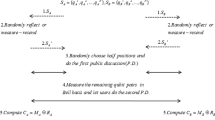Abstract
This article proposes an innovative quantum private comparison (QPC) protocol for n users using GHZ states, where an almost-dishonest third party (TP) is introduced to assist the participants for comparing their secrets. It is argued that as compared to the existing QPC protocols our proposed scheme has some considerable advantages. First, in the existing QPC protocols, the TP can only to determine whether all participants’ secrets are equal or not. Instead of that, in our proposed scheme a TP can even compare the secrets between any subsects of users. Second, since our proposed scheme is based on GHZ state; hence it can ensure higher efficiency as compared to other existing multi-party QPC protocols on d-dimension photons.
Similar content being viewed by others
References
Chang, Y.J., Tsai, C.W., Hwang, T.: Multi-user private comparison protocol using GHZ class states. Quantum Inf. Process 12, 1077–1088 (2013)
Yang, Y.-G, Wen, Q.-Y.: An efficient two-party quantum private comparison protocol with decoy photons and two-photon entanglement. J. Phys. A Math. Theor. 42, 055305 (2009)
Chen, X.-B., Xu, G., Niu, X.-X., Wen, Q.-Y., Yang, Y.-X.: An efficient protocol for the private comparison of equal information based on the triplet entangled state and single-particle measurement. Opt. Commun. 283, 1561–1565 (2010)
Tseng, H.-Y., Lin, J., Hwang, T.: New quantum private comparison protocol using EPR pairs. Quantum Inf. Process 11, 373–384 (2011)
Liu, W., Wang, Y.-B.: Quantum private comparison based on GHZ entangled states. Int. J. Theor. Phys. 51, 3596–3604 (2012)
Liu, W., Wang, Y.-B., Jiang, Z.-T.: An efficient protocol for the quantum private comparison of equality with W state. Opt. Commun. 284, 3160–3163 (2011)
Liu, W., Wang, Y.-B., Jiang, Z.-T., Cao, Y.-Z.: A protocol for the quantum private comparison of equality with χ-Type state. Int. J. Theor. Phys. 51, 69–77 (2011)
Liu, W., Wang, Y.B., Cui, W.: Quantum private comparison protocol based on bell entangled states. Commun. Theor. Phys. 57, 583–588 (2012)
Liu, W., Wang, Y.-B., Jiang, Z.-T., Cao, Y.-Z., Cui, W.: New Quantum Private Comparison Protocol Using χ-Type State. Int. J. Theor. Phys. 51, 1953–1960 (2012)
Gao, F., Guo, F.-Z., Wen, Q.-Y., Zhu, F.-C.: Comment on “Experimental Demonstration of a Quantum Protocol for Byzantine Agreement and Liar Detection”. Phys. Rev. Lett. 101, 208901 (2008)
Gao, F., Lin, S., Wen, Q.-Y., Zhu, F.-C.: A Special eavesdropping on One-Sender versus N -Receiver QSDC Protocol. Chin. Phys. Lett. 25, 1561 (2008)
Gao, F., Qin, S.-J., Wen, Q.-Y., Zhu, F.-C.: A simple participant attack on the Bradler-Dusek protocol. Quantum Info. Comput. 7, 329–334 (2007)
Cai, Q.-Y.: Eavesdropping on the two-way quantum communication protocols with invisible photons. Phys. Lett. A 351, 23–25 (2006)
Liu, W., Wang, Y.B., Wang, X.M.: Multi-party Quantum Private Comparison Protocol Using d-Dimensional Basis States Without Entanglement Swapping. Int. J. Theor. Phys. 53, 1085–1091 (2014)
Wang, Q.L., Sun, H.X., Huang, W.: Multi-party quantum private comparison protocol with n-level entangled states. Quantum Inf. Process. 13, 2370–2389 (2014)
Luo, Q.B., Yang, G.W., She, K., Niu, W.N., Wang, Y.Q.: Multi-party quantum private comparison protocol based on d-dimensional entangled states. Quantum Inf. Process. 13, 2343–2352 (2014)
Yu, C.H., Guo, G.D., Lin, S.: Quantum private comparison with d-level single-particle states. Phys. Scr. 88, 065013 (2013)
Huang, S., Hwang, T., Gope, P.: Multi-party Quantum Private Comparison with an Almost-dishonest Third Party. Quantum Inf. Process. (2015). doi:10.1007/s11128-015-1104-z
Chang, C.-H., Hwang, T., Gope, P.: An Efficient Quantum Private Comparison of Equality over Collective-Noise Channels. Int. J. Theor. Phys. (2015). doi:10.1007/s10773-015-2851-4
Author information
Authors and Affiliations
Corresponding author
Rights and permissions
About this article
Cite this article
Huang, SL., Hwang, T. & Gope, P. Multi-Party Quantum Private Comparison Protocol with an Almost-Dishonest Third Party using GHZ States. Int J Theor Phys 55, 2969–2976 (2016). https://doi.org/10.1007/s10773-016-2929-7
Received:
Accepted:
Published:
Issue Date:
DOI: https://doi.org/10.1007/s10773-016-2929-7




